For thousands of years people have looked up information in encyclopedias. Many people now that Wikipedia is the only encyclopedia that we need. That is a short-sighted view: more encyclopedias give more points of view. Let us explore the history of encyclopedias and look at the variety of encyclopedias (both printed and online) currently available to inform and inspire us.

The World's Best Encyclopedias
Over the years encyclopedias have opened a gateway into the world's information. Even with the coming of Wikipedia, it is profitable to explore the other existing encyclopedias.
The Best Encyclopedias in the World
General Encyclopedias
Some of the best multi-volume general encyclopedias in the English language are the Americana, Britannica, Chambers, Collier's, Everyman's, Groliers, and World Book.
Among the important single-volume general encyclopedias in English are the Columbia and Britannica Concise.
In France, excellent multi-volume general encyclopedias include La Grande Larousse and the Encyclopaedia Universalis, and in Germany the Brockhaus and the Meyers.
With the arrival of the Internet, online general encyclopedias (such as Wikipedia) are now rapidly growing in importance.
Specialized Encyclopedias
Great print-version multi-volume single-subject encyclopedias include McGraw-Hill Encyclopedia of Science & Technology.
Online specialized encyclopedias include the Stanford Encyclopedia of Philosophy.
Historic Encyclopedias
Some of the greatest encyclopedias of the world were published in past centuries.
In ancient Rome, encyclopedic works were written by Marcus Terentius Varro and Pliny the Elder. In late antiquity, Isidore of Seville compiled the Etymologiae (7th century AD), which aimed to summarize all ancient and contemporary learning. In the 10th century the Byzantine Greek encyclopedia, the Suda, was created with around 30,000 articles.
The medieval period produced the Speculum Majus (The Great Mirror) by Vincent de Beauvais and the immense Yongle Dadian Encyclopedia (China, 1408). In the Renaissance Francis Bacon worked on his unfinished Instauratio Magna whose contents were to be presented according to a philosophical scheme.
The modern period saw the publication of L'Encyclopedie, edited by the Enlightenment philosophers, Diderot and d'Alembert (France, 18th century). This encyclopedia's aim, according to Diderot, was to "to change the way people think" and indeed it helped inspire the French Revolution.
In Britain Ephraim Chambers published the Cyclopaedia (1728) and the Encyclopaedia Britannica was first published in 1768-71. The 9th edition (1875) and the 11th edition (1911) of the Britannica were the greatest editions of the Britannica and their articles are still worth consulting.
One of the greatest children's encyclopedias was The Children's Encyclopaedia (edited by Arthur Mees and originally published 1908-10).
The Greatest English-Language Encyclopedia
The 9th Edition (1875) of the Encyclopaedia Britannica (many of its articles are still required reading)
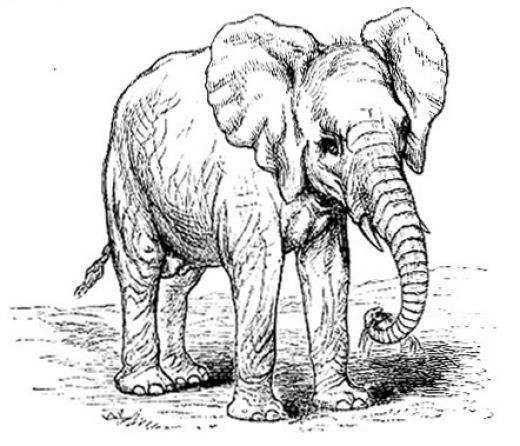 The Encyclopaedia Britannica (9th Edition). This image of the African Elephant comes from the "Elephant" article. |
The Greatest French Encyclopedia
A gift from the French Enlightenment to us
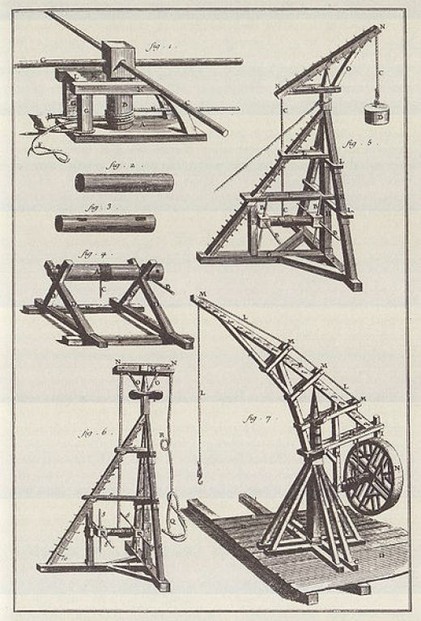 L'Encyclopédie (France, 1750s). This page features diagrams of cranes. |
The Greatest Chinese Encyclopedia
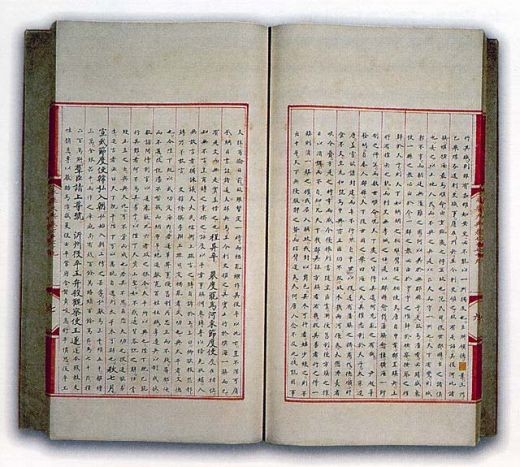 Yongle Dadian Encyclopedia (China, 1408) |
A Beloved Children's Encyclopedia
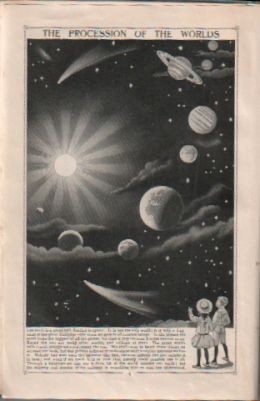 Arthur Mee's The Children's Encyclopaedia (early 20th cent.). This page shows The Procession of the Worlds. |
Great Historic General Encyclopedias on the Internet
Encyclopaedia Britannica, 9th and 10th Editions
The 9th Edition of the Encyclopedia Britannica is often referred to as the "Scholars' Edition". Its articles were written by many great scholars of the late 19th century.
Encyclopedia Americana (1904 and 1918-20 Editions)
The Encyclopedia Americana is regarded as the greatest English language encyclopedia after the Encyclopedia Britannica.
Catholic Encyclopedia (1914 edition)
General encyclopedia written from the Catholic point-of-view. 11,600 articles.
Isn't Wikipedia Enough?
Recently a number of famous encyclopedias (for example, Britannica and Brockhaus) have announced that they are ending the print version of their work. .
There is no doubt that digital versions of encyclopedias have many advantages, for example:
- ease of access wherever you are
- ease of searching
- more timely updating
However, there remain a number of key advantages in having print encyclopedias:
- easier to read long articles on paper (reading on a computer screen causes headaches)
- large maps can be laid out better
- serendipitous discoveries from riffling through the pages of print encyclopedias
- more difficult for authoritarian governments to censor printed encyclopedias
- more difficult for big government and big business to change the historical record
Many people further believe that just one digital encyclopedia, Wikipedia, is all that is really needed. However, there are powerful arguments against this belief, no matter how popular it may be. Consulting more encyclopedias -- especially ones with trusted editors and named contributors -- has excellent benefits:
- multiple viewpoints from several encyclopedias make for richer intellectual experience
- signed articles are quotable sources (unlike Wikipedia's anonymous articles)
- Wikipedia's articles on controversial topics are often manipulated by vested interests
- great editors produce differently designed encyclopedias, each of which adds value
Current General Encyclopedias
Available Online and (Sometimes) in Printed Version
Wikipedia
The world's largest online encyclopedia. The English-language articles alone are more than 3.9 million in number.
Encyclopaedia Britannica
The English-speaking world's largest general encyclopedia. Britannica announced in March 2012 that it will no longer be issuing print versions but the its digital version will remain available by subscription or for free through various library outlets. Many libraries still have the latest print version.
Encyclopedie Larousse en ligne
Online version of the great Larousse Encyclopedia (French language).
Censorship and Encyclopedias
Encyclopedias are part of the historical record. As such, powerful players, such as government and corporations, work to ensure that their mistakes and misdeeds are expunged from the record, including encyclopedias.
This has happened to the printed versions of encyclopedias in the past. For example, when Lavrentiy Beria, the head of the NKVD Soviet secret police organization, was shot in 1952, the editor of the Great Soviet Encyclopedia mailed subscribers, asking them to cut out the three-page article on Beria and paste in a supplied replacement article which offered a different record and assessment of the life of Beria.
Online encyclopedias are equally open -- or even more open -- to censorship and the rewriting of history, particularly in regard to events which political and corporate leaders regard as embarrassing or as contravening current ideologies. A few taps on a keyboard are enough to remove unwanted facts and assessments disappear from the record with little or no trace. This is happening now (see, for example, these articles from BBC News, CNet, Wikinews and Haaretz).
Articles on Encyclopedias and Information
Encyclopaedia Britannica ends its famous print edition
After 244 years reference book firm Encyclopaedia Britannica has decided to stop publishing its famous and weighty 32-volume print edition. (NOTE: read the Comments section for this article -- very interesting.)
Damnatio memoriae
Damnatio memoriae is the Latin phrase literally meaning "condemnation of memory" in the sense of a judgment that a person must not be remembered. It was a form of dishonor that could be passed by the Roman Senate upon traitors or others who brought discredit to the Roman State. The intent was to erase someone from history, a task somewhat easier in ancient times, when documentation was much sparser.
A Short History of the Greatest Encyclopedias of Past and Present
The treasure house of ancient, medieval, modern and Internet encyclopedias.
The Six Sins of the Wikipedia
The author argues that Wikipedia cannot survive in its present form.
Top 10 Reasons Not to Donate to Wikipedia
Also check the links at the end of this article.
The Article "Encyclopedia" in the Encyclopedia Britannica, Ninth Edition
Interesting survey of the encyclopedias of various nations up to the late 19th century.
Arguments for and against Wikipedia
 | A Brief History of Encyclopedias: From Pliny to Wikipedia (Brief Histories) Including topics such as Wikipedia's importance as a global phenomenon, this is a timely consideration of the roles of the guardians and editors of information throughout histor... Hesperus Press / Only $21.41 |
 | Good Faith Collaboration: The Culture of Wikipedia (History and Foundations of Information Science) "The entire work regurgitates the tired old public relations pablum that the Wikipedia organization sputters forth on the Internet and on the increasingly uncritical media that fails to actually investigate stories any more." -- G. Kohs The MIT Press / Only $2.09 |
 | Independent Film Distribution: How to Make a Successful End Run Around the Big Guys "I especially got a lot out of the detailed section of how to work best with the monster of Wikipedia, which can sort of make or break a film, in terms of what's considered 'notable'." -- G. Kohs Michael Wiese Productions / |
More Humanities articles
You might also like
Collecting Seashells: Types of ShellsA look at some seashells you may see on Florida beaches with photos of my own...
Buttons from the Rag Bag! Button Jar Math ActivitiesSave the buttons from discarded clothing and recycle them as fun, hands-on ma...
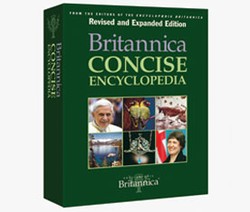








 Ancient Rome: History and Heritageon 02/28/2012
Ancient Rome: History and Heritageon 02/28/2012
 Ancient Greece: History and Heritageon 10/14/2012
Ancient Greece: History and Heritageon 10/14/2012
 Schumann: The Genius Who Composed Scenes From Childhoodon 04/29/2012
Schumann: The Genius Who Composed Scenes From Childhoodon 04/29/2012
 Mahler: The Genius Who Composed the Resurrection Symphonyon 03/04/2012
Mahler: The Genius Who Composed the Resurrection Symphonyon 03/04/2012



Comments
Nice article on encyclopedias. It's shocking to see how often Wikipedia is quoted in students' research papers and even books these days. I
I am huge fan of encyclopedias (printed and on-line) and I can also say I can't rely only on one because, they are written by mere mortals and thus error-prone.
I found out a lot of errors in Wikipedia, especially in 'my' field of fairy tales.
The problem of this open project is it is very time consuming, so experts can hardly find time to participate fully. They are there as some sort of consultants or supervisors, but the most of the volume is done by students, volunteers and so one, what means there is sometimes more enthusiasm than knowledge.
After reading first book on theory of fairy tales I also thought I know and understand everything, but after next dozen I know how small my knowledge really is and how debatable are some theories presented in Wikipedia as indisputable truth.
Thanks for sharing this overview.
Thanks, Mladen! I love the Larousse too. There are so many great encyclopedias in languages other than English. For example, the Kindlers-Literaturlexikon -- an encyclopedia on world literature -- beats any similar literature reference work from the English-speaking world, as far as I can see. Please revisit this page if you have the chance as I intend to add more reviews and pictures of interesting and useful encyclopedias from around the world.
I enjoy reading encyclopedias. I have Larousse print edition and Encarta digital edition enciclopedia. I also own few encyclopedias of animal world, plants, medicine... One whole shelf. :)
Nice selection you've got here in this article.